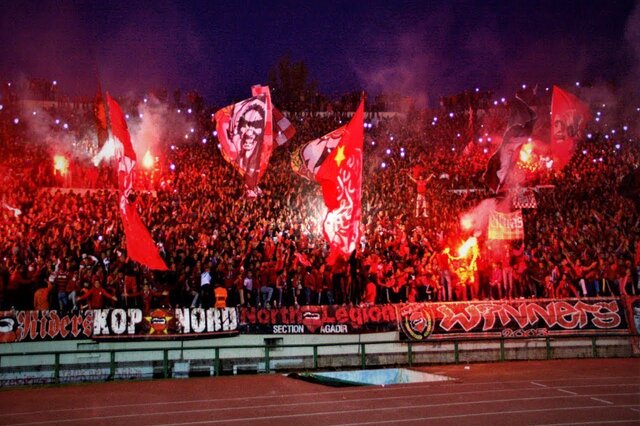Casablanca – When Morocco’s “ultras” crowd into a football stadium, the fan groups’ full-throated chants, spectacular pyrotechnics and sometimes rowdy and anti-authoritarian antics often steal the show.
Casablanca’s stadium rings to the chants of passionate supporters of the city’s Wydad club as they raise coloured placards aloft to form a vast, moving mosaic that spells out their motto: “Free souls”.
The club’s die-hard fan group, known as the “Winners”, has a long-earned reputation for flamboyance – singing, setting off smoke bombs and making their cellphone torches dance collectively like fireflies.
Some 10,000 of them regularly pack the north curve of Mohammed V stadium in Morocco’s economic capital, where they have a reputation for drawing more attention than the action on the pitch.
Thousands of supporters are expected to put on their carefully choreographed show again as the team, fresh from winning the African Champions League, competes in the Club World Cup which started on Wednesday.
“I can’t describe my love for the Wydad fans, they’re very special,” said one fan, Houssam Ait Wahman, 18, before a recent Moroccan league match against Fez that he watched with his mother and sisters.
“Fans from all over the world can’t match us,” he boasted about the Winners, who came first in a global ranking by “Ultras World”, a popular Facebook page dedicated to the phenomenon.
‘Crowd effect’
Some ultras in Morocco and beyond have earned a reputation for violence, mostly brawling with rival fans – but the members are quick to defend what they praise as a fraternity united in their love for the game.
“Supporting Wydad is a passion, a commitment that goes beyond football,” said Mohamed, a former Winner in his 30s who asked not to give his full name.
The Winners are part of the international ultras culture, which has a strong following across the football-obsessed North African country.
The image of Morocco’s ultras has often been associated with violence between rival groups. After two fans were killed in early 2016, authorities banned ultra fans from football grounds nationwide for two years.
Former Winner Mohamed blamed the “crowd effect” and explained that sometimes “it takes just one person to do something stupid and it all kicks off”.
Moroccan sociologist Abderrahim Bourkia, author of a recent essay on the subculture, said some fans “release their frustrations” through chanting, while others resort to violence.
“The solution is to invest in the education of the youth,” he said.
City rivals
Not to be outdone by the Winners, fans of Wydad’s main Casablanca rival, Raja, also have a reputation for crowd-pleasing and exuberant performances.
“Putting on a show is the hallmark of the ultras,” said Bourkia. “It’s a way for them to express themselves and showcase themselves.”
Raja’s two ultras groups, the “Green Boys” and “Ultras Eagles”, are known for their overtly left-wing political slogans, both in the stadium and on social media.
Their song “F bladi delmouni” (They Oppressed Me In My Own Country) calls out inequality and social injustice in the kingdom.
The song has spread beyond Morocco’s borders and has been sung by pro-democracy protesters in neighbouring Algeria and even by Palestinians.
“The Raja fans have an activist culture that gives voice to the voiceless, to stand up against oppression and condemn corruption,” a former Raja ultra told AFP.
The phenomenon turns stadiums into “spaces of free expression”, Bourkia said.
“Being part of the ultras is a unique experience,” said another Raja supporter. “Feeling that you’re being heard helps forge a personality.”
Follow African Insider on Facebook, Twitter and Instagram
Source: AFP
Picture: Twitter/@AfricaFactsZone
For more African news, visit Africaninsider.com


